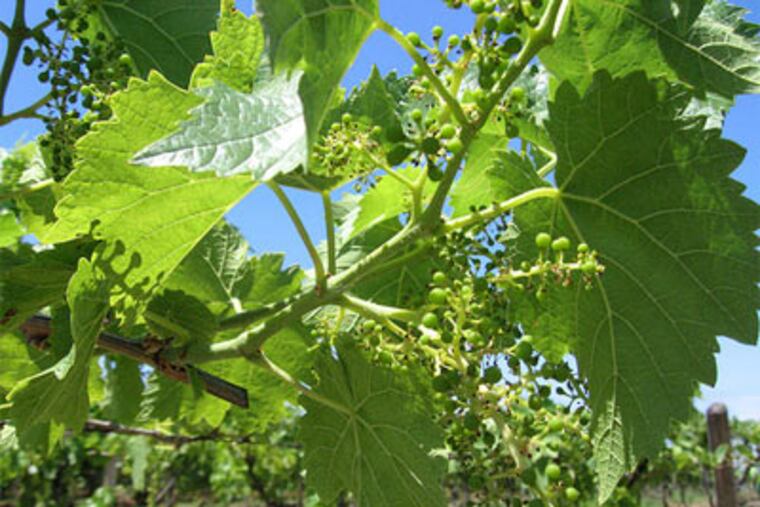Pa. wine bill attracts wrath of grape lovers
Orders from wineries would need to be funneled through the LCB, which would ship bottles to customers, for a fee.

Wine aficionados are trampling on Pennsylvania's latest effort to regulate direct shipments of wine to consumers, calling the proposal too restrictive and too expensive.
They have urged state lawmakers to bottle up a bill that would require wineries to ship customers' wines to the state Liquor Control Board, which would then ship the wine to customers, for a fee.
Federal and state court decisions three years ago left Pennsylvania's restrictive wine laws a shambles. A federal judge ruled in 2005 that Pennsylvania's prohibitions against out-of-state wine shipments were unconstitutional. He ordered the state not to enforce its bans on direct-to-consumer shipments.
Ever since, Pennsylvania residents have been able to order wine to be shipped directly to their homes or offices. But many out-of-state wineries remain leery of the legal limbo and won't ship to Pennsylvania consumers.
"We're still waiting on that clarity from the legislature," said Linette Quinn, a state police spokeswoman. She said there had been no enforcement actions involving direct shipping since the rulings. (New Jersey prohibits all direct shipping.)
Pennsylvania winemakers and wine drinkers are urging state lawmakers to follow the example of the 35 states that permit direct shipping, including 12 of the 19 "control" states that, like Pennsylvania, have state-run systems.
"We really wish they'd recognize what's happened in other states," said Bob Mazza, owner of Mazza Vineyards near Erie and president of the Pennsylvania Winery Association.
"We're not opposed to the LCB," he added. Direct shipping "is really not going to cut into the LCB's profitability or revenue."
Mazza and other winery operators and wine merchants testified against the proposed law, House Bill 2165, at legislative hearings at Paradocx Vineyards in Landenberg, Chester County.
They argued that the bill would too severely restrict the size of wineries permitted to ship to customers, and would make direct shipping too cumbersome and expensive. The bill, sponsored by Rep. Paul Costa (D., Allegheny), would limit direct shipping to wineries that produce 80,000 gallons of wine a year or less.
Costa said that limit was to keep large, out-of-state producers from shipping to Pennsylvania customers while permitting in-state wineries to continue to do so. Representatives of Pennsylvania wineries said the current limit of 200,000 gallons should be maintained, giving in-state wineries room to grow.
Opponents of direct shipping, led by liquor wholesalers and State Store employee unions, argue that shipping directly to customers would deprive the state of revenue and make it easy for minors to buy wine.
"The question you, as legislators, must ask yourself is whether it is a wise policy to create or perpetuate an unregulated, unaccountable, non-face-to-face channel of access for our kids," said Karin Moore, assistant general counsel of the Wine and Spirits Wholesalers of America, in testimony at one of the Chester County hearings.
Other "control" states have grappled with the revenue-loss and underage-buyer issues, and officials in those states say they've had few problems. And they say direct shipping has not been a major source of wine sales.
Proponents of direct shipping cite New Hampshire as a prime example of a control state to emulate.
New Hampshire requires direct shippers to use licensed carriers, such as Federal Express or UPS, and requires carriers and shippers to report all shipments so it can make sure it is not missing any tax revenue. The state also requires that shipments be clearly marked as containing alcohol, and that shippers obtain an adult's signature at delivery.
"We do not believe the direct-ship program has had a negative impact on revenues," said Mark Bodi, chairman of the New Hampshire Liquor Commission.
Bodi said the possibility of minors' attempting to buy alcohol and the potential for wineries to try to avoid paying the required fees were "both a regulatory challenge and concern. However, we have not found these two issues to be of significant negative consequence."
Costa, the sponsor of the Pennsylvania bill, said he had "not done the research on what other states are doing." He said he had begun to hear a lot about New Hampshire's approach from direct-shipping advocates.
"New Hampshire is a good model," said Lynn Benka-Davies, executive director of the House Liquor Control Committee, which has been holding the hearings on H.B. 2165. "It is a state we will be looking at. But it is only about the size of Allegheny County, so they're operating on a much smaller scale."
Wholesalers and distributors who sell liquor to the LCB aren't happy with the proposed direct-shipping bill, either. They are worried that out-of-state shippers would undercut State Store prices, which include a 30 percent markup over wholesale prices, a 6 percent sales tax, and an 18 percent "Johnstown Flood tax."
The bill would cause "a total disruption" of the PLCB system, said Myron Waxman, executive director of the Pennsylvania Wine and Spirits Association, at a June hearing on the bill. His members provide more than 95 percent of the liquor sold in State Stores.
Costa's bill faces tough sledding this year, as the legislature is likely to be in session only briefly before the November election.
Costa said he would reintroduce it next year if it didn't pass this year.